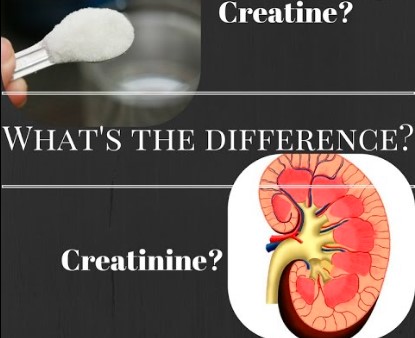Creatine and creatinine are two distinct compounds often associated with muscle function and kidney health. Creatine, a performance-enhancing compound, is naturally found in dietary sources and supplements, serving as an energy source for muscles. On the other hand, creatinine is a waste product that results from the natural breakdown of creatine in the muscles.
It is filtered out of the body by the kidneys and its levels in the blood can serve as a clinical indicator of kidney function. Understanding the differences between creatine and creatinine is crucial for grasping their roles in the body and their implications for overall health and well-being.
What is the Difference between Creatinine and Creatine?
Creatine and creatinine differ primarily in their physiological roles. Creatine serves as a muscle energy source, whereas creatinine acts as a byproduct eliminated from the body. Monitoring creatinine levels assesses kidney function, while creatine levels provide insights into muscle well-being.
Here is the detailed difference between Creatinine and Creatine.
| Aspect | Creatine | Creatinine |
|---|---|---|
| Composition | Nitrogenous acid composed of amino acids arginine, glycine, and methionine. | Waste products are formed by the breakdown of creatine in muscles. |
| Function | Acts as an energy source for muscles during high-intensity activities. | Indicates kidney function when measured in blood. |
| Source | Found in dietary sources and supplements. | Produced in the muscles and filtered out by the kidneys. |
| Clinical Significance | Used as a performance-enhancing supplement. | Indicator of potential kidney issues when elevated. |
| Conversion | Converted to creatinine. | Produced from creatine breakdown in the muscles. |
| Testing | Not typically measured in blood tests. | Measured in blood tests or urine tests to assess kidney function. |
| Health Implications | Generally safe at recommended doses for muscle performance. | Elevated levels may indicate kidney dysfunction or disease. |

Importance of Creatine and Creatinine for Health
The importance of creatine and creatinine for health can be summarized as follows:
Creatine:
- Plays a critical role in cellular metabolism, especially during metabolically stressed states.
- Found in the body’s muscles as well as in the brain.
- Helps muscle cells produce more energy, supports various muscle functions, improves high-intensity exercise performance, and speeds up muscle growth.
- A key player in heart contraction and energy metabolism.
Creatinine:
- A waste product formed by the breakdown of creatine in the muscles.
- A vital indicator of kidney function when measured in blood or urine tests.
- Elevated levels may signify potential kidney issues or disease.
These points highlight the essential roles of creatine and creatinine in energy production, muscle function, and kidney health, underscoring their significance for overall well-being.
Sources of Creatinine and Creatine
Sources of Creatinine:
- Natural Sources:
- Creatinine is a natural waste product generated within the body during the breakdown of creatine phosphate in muscles.
- Produced as a result of normal muscle metabolism during activities like exercise and daily movement.
2. Artificial Sources:
- Creatinine itself does not have artificial sources, as it is a natural byproduct of muscle activity and doesn’t require external input.
Sources of Creatine:
- Natural Sources:
- Creatine is naturally present in various foods, predominantly in animal products.
- Found in higher concentrations in meat, fish, and poultry, providing a dietary source for creatine.
2. Artificial Sources:
- Creatine supplements are commonly used for athletic performance and muscle enhancement.
- Available in various forms such as creatine monohydrate, creatine ethyl ester, and creatine hydrochloride.
- These supplements are artificially synthesized and can be consumed in controlled doses to supplement natural creatine intake.
Understanding the natural and artificial sources of creatinine and creatine contributes to a comprehensive awareness of their origins and significance in the body.
Functions of Creatine and Creatinine
The functions of creatine and creatinine are essential for various physiological processes within the body:
Creatine:
- Acts as an energy reserve for muscles, aiding in high-intensity activities and promoting muscle growth.
- Involved in heart function and energy metabolism.
- Supports cognitive health and brain function.
Creatinine:
- Serves as a marker for kidney function and is widely used in assessing renal health.
- Elevated levels of creatinine in the blood can indicate potential kidney dysfunction or disease.
- Reflects the efficiency of the kidneys in filtering waste products from the bloodstream.
Understanding the distinct functions of creatine and creatinine is crucial for comprehending their roles in muscle energy metabolism, physical performance, and kidney health.
High Levels of Creatine and Creatinine
High levels of creatine and creatinine can lead to distinct symptoms:
High levels of creatine:
- Excessive creatine supplementation can potentially cause gastrointestinal distress, muscle cramping, dehydration, and an increased risk of kidney damage.
- Creatine overconsumption may result in weight gain due to water retention.
High levels of creatinine:
- Elevated creatinine levels in the blood can be an indicator of impaired kidney function, potentially leading to symptoms such as fatigue, swelling in the extremities, changes in urination patterns, and shortness of breath.
- Severe kidney dysfunction associated with high creatinine levels may lead to nausea, vomiting, and overall weakness.
It’s crucial to monitor creatine intake and be mindful of factors that can impact creatinine levels, as both are integral to overall health and well-being.
Impact of Creatinine and Creatine on Kidneys
The impact of creatinine and creatine on kidneys has been a subject of research and discussion, and the findings from various sources shed light on this topic.
Regarding creatine supplementation’s effect on renal function, there have been contrasting viewpoints. Some studies have suggested a potential transient rise in serum creatinine levels from creatine supplements, which can mimic kidney disease, especially when associated with a high-protein diet (PubMed, Mayo Clinic).
However, more recent investigations have indicated that there is less concern today about possible kidney damage from creatine supplementation (Oxford Academic, ScienceDirect, Journal of the International Society of Sports Nutrition). Some case studies have shown no observed kidney damage as a result of creatine supplementation.
In terms of creatinine, it serves as a marker for kidney function, and elevated levels in the blood may indicate a potential kidney problem (National Kidney Foundation). It is essential to monitor creatinine levels and consider factors that may impact its concentration in the bloodstream.
These insights highlight the complexity of the relationship between creatinine, creatine, and kidney health, emphasizing the importance of staying informed about the latest research and expert recommendations.
Frequent Question Answers
| Questions | Answers |
|---|---|
| Does creatine increase creatinine levels? | Creatine supplementation may increase creatinine levels, but long- and short-term studies have found that creatine doses ≤10g/day do not impair kidney function. |
| Is creatinine a waste of creatine? | Creatinine is not a waste of creatine, but it can act as a false indicator of renal dysfunction when creatine supplementation increases creatinine levels. |
| Is high creatinine good or bad? | High creatinine levels can be an indicator of potential kidney issues, especially if they are increased following creatine supplementation. |
| What is a normal creatinine level? | The normal range for creatinine levels can vary, but typically falls between 0.84 to 1.21 milligrams per deciliter (mg/dL) for men, and 0.78 to 1.06 mg/dL for women. |
| Is creatine safe for kidneys? | Studies have shown that creatine doses ≤10g/day do not impair kidney function and are generally considered safe for kidneys. |
| What are the risks of creatine? | The potential risks of creatine supplementation include increased creatinine levels, particularly with high doses, and the associated potential for kidney damage. |
| How to reduce creatinine? | Methods to potentially reduce creatinine levels may include managing creatine intake, staying properly hydrated, and consulting with a healthcare professional for personalized guidance. |
| How much creatine is safe? | Creatine doses ≤10g/day are generally considered safe and do not impair kidney function, according to long- and short-term studies. |
| Can drinking water lower creatinine? | Staying well-hydrated by drinking water may help maintain normal creatinine levels, but individual responses can vary. |
| Is 25 a high creatinine level? | A creatinine level of 25 would be extremely high and likely indicative of severe kidney dysfunction, requiring immediate medical attention. |
| What is a poor creatinine level? | The normal range for creatinine levels can vary but typically falls between 0.84 to 1.21 milligrams per deciliter (mg/dL) for men, and 0.78 to 1.06 mg/dL for women. |
Conclusion
The difference between creatinine and creatine lies in their distinct roles within the body. Creatine is a performance-enhancing compound found in dietary sources and supplements, primarily involved in energy metabolism for muscle contraction and supporting cognitive health. On the other hand, creatinine is a waste product formed from the breakdown of creatine in the muscles, serving as a marker for kidney function. Elevated levels of creatinine in the blood may indicate potential kidney dysfunction, making it a crucial clinical indicator.
In conclusion, while creatine plays a vital role in energy metabolism and muscle function, creatinine serves as a valuable marker for kidney health. Understanding the disparity between these two compounds is essential for comprehending their physiological significance and the implications for overall well-being.






Leave a Reply